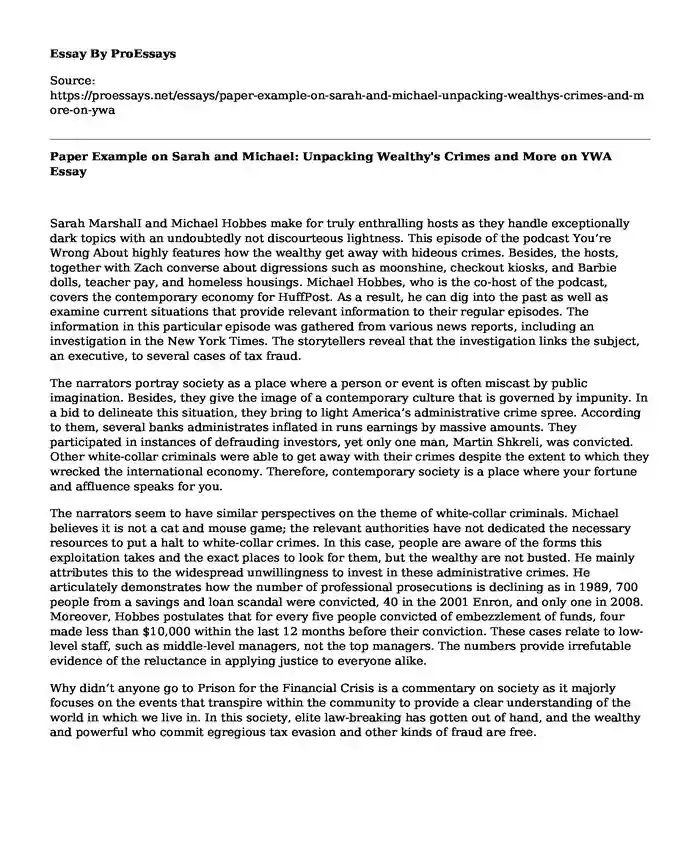Sarah MarshalI and Michael Hobbes make for truly enthralling hosts as they handle exceptionally dark topics with an undoubtedly not discourteous lightness. This episode of the podcast You’re Wrong About highly features how the wealthy get away with hideous crimes. Besides, the hosts, together with Zach converse about digressions such as moonshine, checkout kiosks, and Barbie dolls, teacher pay, and homeless housings. Michael Hobbes, who is the co-host of the podcast, covers the contemporary economy for HuffPost. As a result, he can dig into the past as well as examine current situations that provide relevant information to their regular episodes. The information in this particular episode was gathered from various news reports, including an investigation in the New York Times. The storytellers reveal that the investigation links the subject, an executive, to several cases of tax fraud.
The narrators portray society as a place where a person or event is often miscast by public imagination. Besides, they give the image of a contemporary culture that is governed by impunity. In a bid to delineate this situation, they bring to light America’s administrative crime spree. According to them, several banks administrates inflated in runs earnings by massive amounts. They participated in instances of defrauding investors, yet only one man, Martin Shkreli, was convicted. Other white-collar criminals were able to get away with their crimes despite the extent to which they wrecked the international economy. Therefore, contemporary society is a place where your fortune and affluence speaks for you.
The narrators seem to have similar perspectives on the theme of white-collar criminals. Michael believes it is not a cat and mouse game; the relevant authorities have not dedicated the necessary resources to put a halt to white-collar crimes. In this case, people are aware of the forms this exploitation takes and the exact places to look for them, but the wealthy are not busted. He mainly attributes this to the widespread unwillingness to invest in these administrative crimes. He articulately demonstrates how the number of professional prosecutions is declining as in 1989, 700 people from a savings and loan scandal were convicted, 40 in the 2001 Enron, and only one in 2008. Moreover, Hobbes postulates that for every five people convicted of embezzlement of funds, four made less than $10,000 within the last 12 months before their conviction. These cases relate to low-level staff, such as middle-level managers, not the top managers. The numbers provide irrefutable evidence of the reluctance in applying justice to everyone alike.
Why didn’t anyone go to Prison for the Financial Crisis is a commentary on society as it majorly focuses on the events that transpire within the community to provide a clear understanding of the world in which we live in. In this society, elite law-breaking has gotten out of hand, and the wealthy and powerful who commit egregious tax evasion and other kinds of fraud are free.
Conclusion
The episode has the historical/cultural significance of using the past as a lens to evaluate current occurrences in the same field. Hobbes compares the past and the present under the subject of white-collar crimes and concludes that the prosecutions now are fewer than those at the time when they began their study. For instance, the current world only provides for 3% of millionaires to be audited.
Cite this page
Paper Example on Sarah and Michael: Unpacking Wealthy's Crimes and More on YWA. (2023, Sep 22). Retrieved from https://proessays.net/essays/paper-example-on-sarah-and-michael-unpacking-wealthys-crimes-and-more-on-ywa
If you are the original author of this essay and no longer wish to have it published on the ProEssays website, please click below to request its removal:
- Counseling for Multiculturalism and Social Justice Reflection Paper
- Insurance Plan for Single Mothers - Essay Sample
- Deaf Rights - Essay Sample
- Essay Example on Judge Career
- Essay on the Rise of Medici Bank: Exploring 15th Century Financial Power
- Transnational Crimes: Effects Across Borders & Beyond - Research Paper
- Essay Example on Supreme Court Judgments: Federal Govt. & States Relationship







